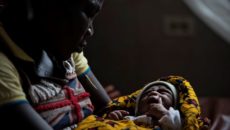A new survey report on the success of combating the Ebola virus disease in Liberia has underscored the need for active community participation to improve future health systems in the country.
The survey titled, “Understanding and Building Community Resilience in Liberia’s Health System,†was conducted by the Liberia Center Outcomes Research in Mental Health, an affiliate of the Carter Center. The survey focused on interviews with stakeholders, including local health officials, citizens, and Ebola survivors in Margibi and Montserrado.
It was aimed at understanding the key factors that contributed to community resilience during the Ebola epidemic. It also identified barriers and facilitators to community resilience following the Ebola outbreak and examined factors that strengthened or weakened community resilience.
After examining how citizens responded to crises in the past, it determined how lessons learned from both situations can be used to address future situations. The report encouraged the government to develop trusting relationships with communities to help more effectively respond to future health emergencies.
Wilfred Gwaikolo, the deputy program lead at the Carter Center’s Mental Health Program, said the findings and recommendations of the report were based on interviews with 30 stakeholders, including local organizations.
Speaking to a team of journalists in Monrovia, Gwaikolo stressed that explaining the report to the public will help reveal the reaction of communities to the Ebola outbreak and how to respond to outbreaks in the future.
“Part of the research was to find out how the community can be resilient,†he said.
According to him, the report further revealed how people responded similarly to Ebola and the civil war, adding that both incidents invoked fear, resulted to loss of lives and impacted economic situations.
The report noted that while enemies and targets were visible during the civil war, that was not the case with the Ebola outbreak, where Ebola was an unknown enemy and came with a lot of misinformation that caused stigmatization.
During the outbreak, Gwaikolo said communities adopted the custom of handwashing, quarantining suspected hosts, and practicing good sanitation to mitigate the outbreak.
The first Ebola case was reported in March 2014. An estimated 11,000 deaths occurred in Liberia, Guinea, and Sierra Leone between 2014 and 2016, as a result of the outbreak, according to the American Centers for Disease Control and Prevention.
While the civil war also led to the loss of hundreds of thousands of lives, some Liberians believe that the Ebola outbreak was fiercer than the civil war.
A resident of Paynesville, James Mulbah said Ebola brought changes to the normal ways of life.
“We had to live like strangers. We were not allowed to eat together,†Mulbah said.
According to him, the culture of caring for sick family members and loved ones was completely taken away during the Ebola outbreak, as families were prevented from performing once essential tasks, such as burying their dead.
Madu Kamara told The Bush Chicken that Ebola was the worst crisis she has ever witnessed.
“I lost my dearest husband, my father, mother, sister, brothers and other family members. I will never forget for the rest of my life,†Kamara said.
Featured photo courtesy of UNMEER/ Martinne Perret



